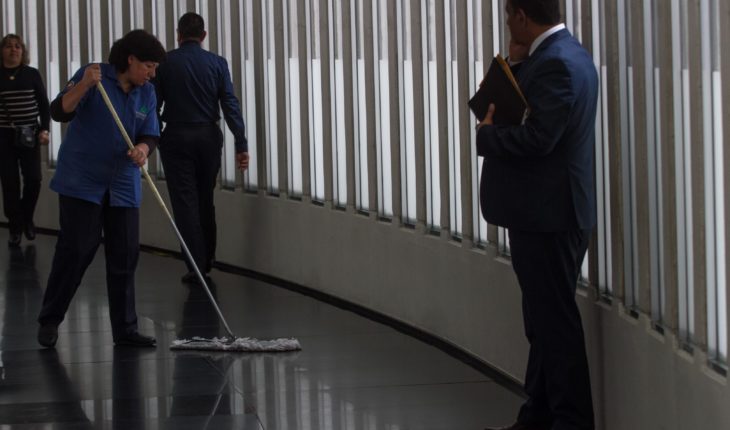Lilia is a worker’s home, in his own and others. He began to do this work remunerated when their spouse lost his job, and although he later found another, the income was insufficient so she retained his. For 15 years, rises each morning before everyone to prepare breakfast and leave a little clean house, before leaving from Ecatepec to any area of the city to clean others.
When preparing more food and your spouse “helps” washing dishes and their own clothes, to lighten her load. Lilia works six days a week, but recently warned in the House which was on Saturday that no longer can go, because at home no longer let it. “Coupling you much clothing the weekend”, said his spouse, so the woman of 53 years with three children over the age of 20, now will only work – outside your House – five days to not neglect the tasks of your own home.
Read: Women caregivers serve 42 million dependents; the State does not recognize his work Lilia is one of thousands of women who in Mexico – as in around the world, according to the International Labour Organization – work double time: the paid off their homes and the unpaid, within them, doing work of domestic care and persons. This work is more respondent around the world, and however, is made in 80% by women, due to unequal distribution inside the home and the lack of services provided by the State.
Although all people need care, are women who do most of this unpaid work: three quarters of caregivers in the world are female. “No country in the world recorded an egalitarian unpaid provision of care between men and women”, says the ILO in a report.
Around the world, says the Agency, this work is done mostly without pay, and women spend on average 3.2 times more time than men to these tasks, requires the ‘work of care and care workers’ ILO report, published in last August.
“Becomes increasingly apparent double presence, the second shift, the double day of women have increased their participation in national labour markets and transfers or global care chains”, dictates the unpublished article ‘ work domestic and care: its importance and main findings in the Mexican case ‘ provided by the author Brígida García, researcher at the Colegio de Mexico (Colmex).
For the National Institute of women (INMUJERES), care is a work of “invisible subsidy for the economic system”. IE: women supplement services that should grant State families to maintain social welfare, making double or triple day and sacrificing their own quality of life by not having options to take care of their families in appropriate conditions.
This is because, as women began to join the paid work, men were not integrated into the work of care, so now women have a double day of work while men only are dedicated to work remuneradamente, he explained Zendejas Valentina, Deputy Director of the Institute of leadership Simone de Beauvoir (ILSB).
For its part, the researcher Makieze Medina warned that women have assumed responsibilities of a range of public services that has gone precarizando, which suffer from a poverty of time, they have double or triple working day and their self-care is see much diminished.
“The resolution to these shortcomings cannot remain in that loads are distributed between the couple and the family inside, because the attention of care involving the sustainability of life porque la atencion de el cuidado que implica la sostenibilidad de la vida es is a resolution public, not private,”, said Medina, Member of the network care of Mexico.
However, care needs are in fact resolved in families and there is still a predisposition to believe that it is a female duty. According to the national survey on discrimination (ENADIS) posted in recent months by the INEGI, 23% of men and 21% of women over the age of 18 years, he said according to the phrase “women should help in the tasks of the home more than men”.
How happens to Guadalupe, a stylist who even though it contributes to family income, continues the work of a housewife. Also take care some evenings to his mother, who has heart disease. Lupita seeks to not schedule appointments at mid-afternoon to return to eat with his spouse, since he dislikes eating alone. After going with her mother to make sure to eat, to take their medicines, and not to do thorough housekeeping.
Share this work with his sister, who also lives in that House, because his brother of nearly 40 years – who do live there – distanced himself from the beginning, “them that’s up to you, to me I don’t mess”, les said verbatim.
Zendejas Valentina explains that even though more and more men are involved care, it is still a female “assignment”. “They do so to the extent that their paid work allows them to do so, but the activities that have to do Yes or Yes remain the responsibility of women,” said the Deputy Director of the ILSB in interview. This “duty” delegated to the women, added, it is an obstacle to their integration into the labour market and for an economic equal autonomy.
“It is a hard work and unpaid, that men do not want to do,” said Ana Pecova, Director of EQUIS-Justicia for women for its part. “Nobody wants it to do but you have to do to run the family, households are as small economies, someone has to manage it”.
And when formal employment of a woman does not allow you to devote himself to manage that home, that work goes relegating in other women, sometimes contracting out services and many times asking for the support of family members.
“As all inequalities, not all women affect us in the same way. Which have resources subcontract it, always another woman. “That do not have resources are divided, have a longer day, ask the grandmother – to work unpaid, of course – so the daughters, i.e., is a job that we always spend each other”, said Zendejas.
However, not all mothers or caregivers have a family network in which support to cover the 24 hours required by the work of care. It is the case of Laura, who, in his childhood, took care of his sister two years younger because his mother worked after having divorced; but now lives far from her family and can not ask them to pick up her daughter at school and feed her while she steps out from his formal employment, which does have time.
“Before paying a service at home but it is very expensive and complicated, I preferred to get her to swimming. On Sunday I Cook for the entire week and bring in tuppers because it is very expensive to eat on the street. What I can’t do is go for it, but a person who works über going by an evening school teacher of English and they go together to pick up the morning school Valentina. I pass by it there”, says Laura Ríos, official of the care work of the Organization Oxfam in Mexico project.
While the State is not responsible for creating public policies to fill this void that currently women fill, work only is will go delegating to other women, says Ana Pecova.
The wage gap between men and women, a problem that has been highly debated in all forums of gender equity, arises precisely from the unequal distribution of care work, explains Lucía Pérez-Fragoso, researcher for the Commission Economic for Latin America and the Caribbean (ECLAC). As the majority of women have someone who care, companies reflect their work on the grounds that “they will be distracted” with their family matters, which are paid less or are given less responsibility. ” But we are replacing the State, we are doing an enormous task to keep the country running,”says the expert.
Continue at the current pace, this gap between men and women by the burden of work of care will take 210 years in closed, projects the ILO.
this publication was made possible through the support of Kellogg Foundation.





